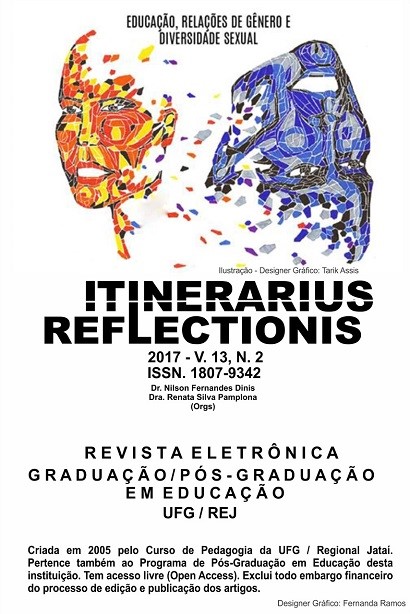EXPECTATIONS AND EXPERIENCES: Highly educated migrant women in the Finnish labour market
DOI:
https://doi.org/10.5216/rir.v13i2.46450Resumo
Gender is at the core of migration. There is need of research that explores interconnections between gender and employment. The research addresses how gendered structures and the processes of working life are reflected among the skilled migrant women in the Finnish labour market.
Key-words: gender studies, migrant studies, integration, employment, intersectionality.
Gênero está no centro da imigração. Há necessidade de pesquisas que explorem as interconexões entre gênero e empregabilidade. A pesquisa mostra como estruturas de gênero e o processo da vida trabalhista estão refletidos em mulheres imigrantes diplomadas no mercado de trabalho finlandês.
Palavras-chave: estudos de gênero, estudos migratórios, integração, empregabilidade, interseccionabilidade.
Downloads
Referências
Web links
COME2: http://come2.fi/about/at-work-in-finland/
Kotouttaminen.fi: www.kotouttaminen.fi
Monika-Naiset liitto ry: www.monikanaiset.fi
Project Forward: http://forwardproject.eu/fi/
Statistics Finland: http://www.stat.fi/meta/kas/ulkomaalaistaus.html
Väestöliitto: www.vaestoliitto.fi
Unpublished sources
Interwiews
Sources:
AHMAD, A. Getting a job in Finland: The social networks of immigrants from the indian subcontinent in the Helsinki metropolitan labour market. Research Reports No. 247, Department of Sociology. Helsinki: University of Helsinki, 2005.
BASTIA, T. Intersectionality, migration and development.
Migration, Gender and Social Justice, Progress in Development Studies, 2014. Disponível em http://journals.sagepub.com/doi/abs/10.1177/1464993414521330. Acesso em. 12.2.2017.
CLELAND SILVA, T. Packaging Nurses: Mapping the social worlds of transnational human resource management. Helsinki: Publications of Hanken School of Economics, 2016.
CRENSHAW, K. Demarginalizing the Intersection of Race and Sex: A Black Feminist Critique of Antidiscrimination Doctrine, Feminist Theory and Antiracist Politics, 139–167. Chigago:University of Chicago Legal Forum, 1989.
CRENSHAW K. Mapping the Margins: Intersectionality, Identity Politics, and Violence against Women of Color.Stanford Law Review, v. 43, p. 12 41–99, 1991.
EHN, B. Arbetets flytande gränser. En fabriksstudie. Stockholm: Prisma, 1981.
FORSANDER, A. Luottamuksen ehdot: maahanmuuttajat 1990-luvun suomalaisilla työmarkkinoilla. Väestöntutkimuslaitoksen julkaisusarja D 39/2002. Helsinki: Väestöliitto, 2002.
HILTUNEN, S. Monikulttuurisuus Euroopan reunamailla. Maahanmuuttajan matka suomalaiseen yhteiskuntaan.Pohjois-Karjalan ammattikorkeakoulun julkaisuja B: 42, 2012.
IRNI, S. Experience is a National Asset’: A Postcolonial Reading of Ageing in the Labour Market. – Complying in Colonialism: Gender, Race and Ethnicity in the Nordic Region. London: Ashgate, 2009.
JULKUNEN, R. Työelämän tasa-arvopolitiikkaa.Sosiaali- ja terveysministeriön selvityksiä 2009:53.Helsinki: Yliopistopaino, 2009.
LARJA, L. et al. Discrimination in the Finnish Labour Market. An Overview and a Field Experiment on Recruitment. Publications of Employment and the Economy 16/2012. Helsinki: Ministry of Employment and the Economy, 2012.
LINNANMÄKI-KOSKELA S. Maahanmuuttajien työmarkkinaintegraatio. Vuosina 1989-1993 Suomeen muuttaneiden tarkastelua vuoteen 2007 asti. City of Helsinki Urban Facts. Helsinki: Edita Prima Oy, 2010.
MAY, VIVIAN M. Intersecionality. Rethinking Women´s and Gender Studies. New York: Routledge, 2012.
MCCALL, L. The Complexity of Intersectionality. Signs: Jounal of
Women n Culture and Society, v. 30:3, p. 1771–1800, 2005.
NASH, JENNIFER C. Re-Thinking Intersectionality. FeministReview, v. 89, p. 1–15, 2008.
NIEMINEN, T. et al. Ulkomaista syntyperää olevien työ ja hyvinvointi Suomessa 2014. Helsinki: Tilastokeskus, 2015.
NÄRE, L. Hoivatyön globaaleilla markkinoilla – Filippiiniläisten
sairaanhoitajien rekrytointi Suomeen jälkikolonialistisena käytäntönä.Sosiologia, v. 49, n. 3, p. 206–221, 2012.
PETRIKA, I. The role of Finnish language among immigrants in the Finnish labour market. Bachelor Thesis / Multilingual Management. Helsinki: Haaga-Helia, University of Applied Sciences, 2014.
PITKÄNEN, P. Terveydenhuollon kansainvälistyvät toimintaympäristöt. – Pitkänen, Pirkko (toim.) Kulttuurienkohtaaminenarjessa, p. 75–99. Tampere: Vastapaino, 2012.
POVRZANOVIC FRYKMAN M. Struggle for Recognition: Bosnian Refugee´s Employment Experiences in Sweden. Refugee Survey Quarterly, v. 31, n.1, p. 54–79, 2012.
PRIPP, O. Företagande i minoritet. Om etnicitet, strategier och resurser bland assyrier och syrianer i Södertälje.Tumba: Mångkulturellcentrum, 2001.
ROSSI, L. Identiteetti, queer ja intersektionaalisuus: hankala
yhtälö. Kulttuurintutkimus, v. 25, n. 1, p. 27–37, 2008.
SAUKKONEN, P. From fragmentation to integration. Dealing with migration flows in Finland. 18.11.2016 Helsinki: Sitra Memos, 2016.
STEEL, T.; TUORI, A. ”Olenko minä niin eksoottinen?”. Pakolaistaustaisten naisten työelämään liittyvä identiteettityö.Elorevol 23 - 2/2016. Disponível em http://www.elore.fi/arkisto/2_16/steel_tuori.pdf. Acesso em. 12.2.2017.
SUTELA, H. Lähi-idästä ja Afrikasta kotoisin olevien naisten kotoutumiseen kiinnitettävä huomiota. Tieto&trendit 2/2016. Disponívelemhttp://tietotrendit.stat.fi/mag/article/167. Acessoem. 12.2.2017.
THOMAS, D.; ELY, R. Making Differences Matter: A New Paradigm
for Managing Diversity. Harvard Business Review, v. 74, n. 5, p. 79–90, 1996.
TUORI, S.The Politics of Multicultural Encounters: Feminist Postcolonial
Perspectives. Åbo: Åbo Akademis Förlag, 2009.
WAHLBECK, Ö. Mångkulturalism i Finland – en kritisk litteratursöversikt.
Åbo: Åbo Akademi, 2003.
YIJÄLÄ, A. Toimeentulotuki - urapolun umpikuja vai ponnahduslauta taloudelliseen hyvinvointiin? Pitkittäistarkastelu helsinkiläisten maahanmuuttajien tukitarpeeseen ja siitä irtautumiseen vuosina 2006-2011. Tutkimuksia 2016:2. Helsinki: Helsingin kaupungin tietokeskus, 2016.
YIJÄLÄ, A.; NYMAN, M. Living in limbo. Qualitative case study of skilled Iraqi asylum seekers in Finland. City of Helsinki Urban Facts. Helsinki: Research Series 2017
Downloads
Publicado
Como Citar
Edição
Seção
Licença
Os artigos encaminhados para publição na revista ITINERARIUS REFLECTIONIS deverão ser originais e não publicados ou propostos para tal fim em outra revista. Aceitam-se artigos escritos em Português, Espanhol e Inglês. A revista ITINERARIUS REFLECTIONIS se reserva o direito de efetuar, nos originais, alterações de ordem normativa, ortográfica e gramatical, com vistas a manter o padrão culto da língua, respeitando, porém, o estilo dos autores. As provas finais não serão enviadas aos autores. Texto sobre Copyright do conteúdo da Revista.


